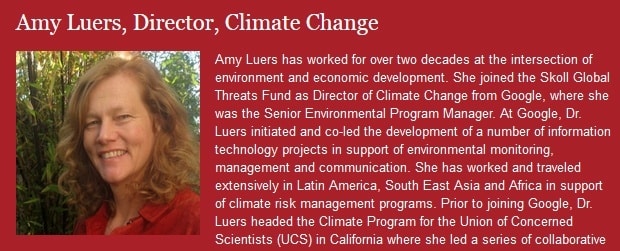A new essay in the peer-reviewed literature searches for the secret formula by which to manipulate public opinion.

Amy Luers calls herself “a scientist.” An online bio tells us she
holds a Ph.D. in environmental science and an M.A. in international policy studies, both from Stanford University, and a M.S. and B.S. in environmental resources engineering from Humboldt State University.
It also says she used to lead the “Climate Program for the Union of Concerned Scientists (UCS) in California.” You remember the UCS? I mentioned them back in January:
Rather than being limited to those with scientific credentials, membership in that US-based lobby group is open to anyone with a credit card.
As environmental writer Mark Lynas observed recently, this is “one of the most ideological of all the green groups.” In his view, scientists who work for that organization “leave their credentials at the door.”
Luers is now the director of climate change for the Skoll Global Threats Fund, which is financed by the Skoll Foundation – which itself pursues a “vision of a sustainable world of peace and prosperity.”
Luers is also the author of an essay published this week in the peer-reviewed academic journal, Climatic Change. You can read the full text of that essay here (a backup is here). It provides some depressing insights into how professional climate activists think.
For starters, although these people are desperate to connect with the public, they aren’t interested in actually talking to the public. It never occurs to them that ordinary Moms and Dads might reject their activist views – or their activist goals.
Ordinary people don’t have minds, priorities, and opinions of their own. In the view of people such as Luers, they’re merely raw material. The mission is to figure out the secret formula by which they can be manipulated to support the right policies.
Luers says she wants to “strengthen climate engagement.” She therefore
interviewed over 40 climate advocates, more than a dozen representatives from the foundation community, and a dozen academics.
before arriving at the less-than-earth-shattering conclusion that “social scientists and advocates must work together to build a culture of learning.”
You, me, MIT’s Technology Review, the Breakthrough Institute, and the dog next door may all understand that currently-available forms of renewable energy are hamstrung by enormous technical and economic shortcomings – that, for the foreseeable future, we’re stuck with fossil fuels.
As the Technology Review wrote earlier this year:
Renewable energy sources, like solar and advanced biofuels, are simply not yet ready to compete with fossil fuels.
As the founders of the Breakthrough Institute wrote two days ago in a piece titled No Solar Way Around It,
there’s little evidence that renewables have supplanted – rather than supplemented – fossil fuel production anywhere in the world.
Nevertheless, Luers stubbornly insists:
We already have the technical know-how to achieve significant carbon reductions, yet social inertia and vested corporate and political interests are preventing progress.
Yes, that same old weary refrain. My assumptions aren’t the problem. My refusal to acknowledge reality isn’t at fault. It’s those nefarious corporate interests aligned against me who are to blame.
But the crucial issue is: How does this scientist approach the “climate crisis”?
Luers’ essay declares that her side of the climate debate needs to “take control of the conversation.” She talks about:
- creating “political support”
- “the larger political landscape”
- “longer-term political needs”
- the need to build “political will”
- building “a political and public base of support”
- [all bolding added by me]
She says that “political research techniques and analyses have grown in sophistication, enabling analysts to learn a good deal about what works and what does not in political campaigns.”
She makes statements such as: “We need to start picking our battles, designing our campaigns, and assessing our losses and wins.” She’s keen on “engaging the public on climate primarily by selling it as a personally relevant issue.”
In other words, her paper has absolutely nothing to do with science. It’s about political strategizing. The word “political” appears in it no less than 22 times.
In 2013, this is what passes for peer-reviewed academic research. These are the sorts of essays that scientifically trained people now spend their time writing.
with apologies to Willie Nelson. See him perform Mammas, Don’t Let Your Babies Grow Up To Be Cowboys here:





